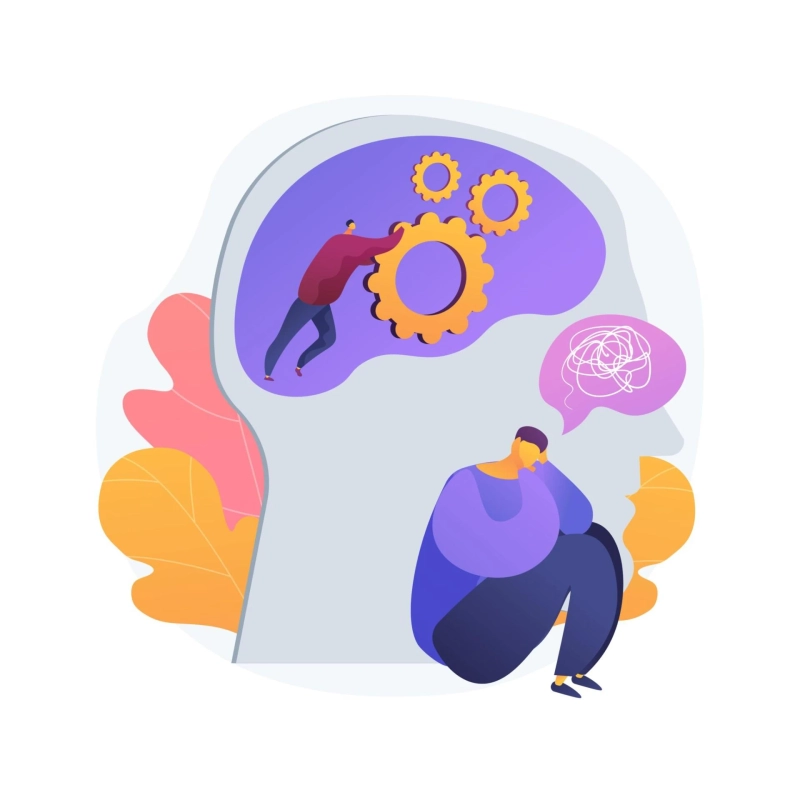Nutrition's impact on behavioral health is becoming more widely recognized. Patients are seeking botanical and organic remedies for the management and treatment of anxiety and depression as pharmaceutical drugs become more expensive and produce undesirable side effects.
Psychiatric issues are one of the most common conditions addressed by psychiatrists, and they frequently necessitate a long-term pharmaceutical regimen.
The Diagnostic and Statistical Manual of Mental Disorders (DSM-IV-TR) states, a perpetual feeling of apprehension that meddles with an individual's capacity to unwind describes anxiety.
A generalized anxiety disorder affects roughly 6.8 million people in the United States. Many people may experience a variety of physical and cognitive adverse effects because of their treatment.
Whereas, major depressive disorder/ depression is a mood-affecting disorder. In the United States, it influences roughly 17 million people.
It's anything but amazing that there is widespread interest in discovering organic anxiety and depression therapies with a lower hazard of unfavorable consequences or withdrawal.
It's necessary to keep in mind that there's no one-size-fits-all solution for psychological diseases, and you'll probably get the best benefit from a combination of approaches.
Supplements For Anxiety and Depression
Here are the seven best supplements to fight anxiety and depression. Speak to your psychiatrist before starting a new supplement.
St. John's Wort
St. John's wort is a famous herbal supplement for treating anxiety and depression, however is significantly less effective for treating anxiety. Researchers have reviewed this herb to treat other mood-affected disorders, like severe depression, anxiety-related disorders, obsessive-compulsive disorder (OCD), and seasonal affective disorder (SAD.) However, no firm evidence of efficacy has been found in research on St. John's wort for these uses. Just like several herbs, St. John's Wort might react with regularly prescribed drugs. Significantly, the plant has a strong interaction with numerous antidepressants, prompting dangerous results. Clinical preliminaries in grown-ups have used 300 milligrams of St. John's wort as 0.3% hypericin extract, required three times each day for as long as a half year, for treating depression. After the underlying treatment, a few groups decide to go onto a lower maintenance dose of 300 milligrams to 600 milligrams of St. John's wort each day.NAC (N-acetylcysteine)
NAC is the supplemental type of cysteine, which is an amino acid. It has the potential to alleviate anxiety and depression.In particular, cysteine came under semi-essential amino acid, which means the body can make it by itself, absorb it from high-protein foods (chicken and beef), or acquire it from a NAC supplement.Notwithstanding, a suggested dose of NAC should be as close to 3 grams each day. NAC can be given intravenously, aerosolized, or in liquid form. Though, it is readily accessible as a tablet.NAC promotes the dysregulation of dopamine and glutamate, which are mainly mood-affecting neurotransmitters. A person suffering from depression requires daily doses of NAC ranging from 2 to 2.4 grams.Rhodiola rosea
(Rhodiola Rosea), is an organic herb that matures in Russia and Asia. An examination showed that taking 400 mg of Rhodiola decoction day by day for 12 weeks worked on concomitant symptoms such as anxiety, weariness, and peevishness.Rhodiola might assist with combatting pressure and can aid in battling exhaustion, anxiety, and depression. Rhodiola Rosea is an organic, reliable herb that boosts stress tolerance by promoting the body's stress response system.Ashwagandha
Ashwagandha (Withania somnifera) is an Indian native herb that has long been utilized in Ayurveda, one of the world's oldest healing systems.Researchers conducted a clinical trial among adults with chronic stress related to the effectiveness and safety of ashwagandha, which shows 600 mg of this herb for 60 days proven to be well-tolerated among adults. Ashwagandha is useful for bringing down feelings of anxiety, boosting mood, and bringing down cortisol levels. Contrasted with the placebo treatment, using ashwagandha as a herbal supplement was unequivocally connected with a more noteworthy reduction in anxiety and depression symptoms.Magnesium
Magnesium is a significant mineral that may profit those with anxiety and depression. Magnesium deficiency is frequent in those who suffer from depression, and studies show that supplementing with it can help them feel better.Exploration shows that supplemental magnesium can be effective in balancing out the temperament. It might help in mitigating the manifestations in individuals experiencing mild-to-moderate anxiety and depression. In contrast to placebo, studies suggest that consuming 248 mg of magnesium per day for six weeks substantially eased depressive symptoms.Zinc
Zinc inadequacy can prompt depression, elevated anxiety levels, peevishness, and emotional imbalance.Clinical investigations have found that insufficient zinc consumption adds to exacerbate depressive symptoms, and patients experiencing depression have a lower level of zinc in the blood. Serum zinc levels in those with depression were roughly 0.12 g/mL lower than in people without depression, according to a review of 17 observational studies.Creatine
Creatine as a supplement appears to be effective for those suffering from psychiatric illnesses. Individuals with anxiety and depression, for example, have been found to have lower creatine levels in their brains.Creatine is an organic compound that assumes a significant part in keeping up with mental energy. 2–10 grams of creatine each day may lessen manifestations in individuals with major depressive disorder.Anxiety and depression are mental turmoil that influences many individuals around the world. Although, medication and counseling opt as a mode of treatment for anxiety and depression. But a few groups might need to attempt other safe techniques like nutritional changes or supplements to mitigate their manifestations.
We have thoroughly researched the supplements mentioned in this article for their capability to reduce anxiety and depression symptoms and might fit for particular individuals with depression and anxiety.
Notwithstanding, it's fundamental to talk about any supplements with your behavioral health expert to assure that it's safe for you and meets your requirements.



